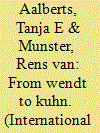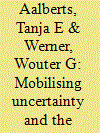|
|
|
Sort Order |
|
|
|
Items / Page
|
|
|
|
|
|
|
| Srl | Item |
| 1 |
ID:
083580


|
|
|
|
|
| Publication |
2008.
|
| Summary/Abstract |
Constructivism is often identified as the legitimate occupant of the middle ground between rationalism and reflectivism that emerged from the Third Debate in international relations (IR) theory. Indeed, the rationalist-constructivist debate is already being framed as the next dominant debate with the IR community. This paper evaluates the bridge-building project as initiated by Alexander Wendt, and takes issue with the via media as proposed by the so-called conventional constructivists. It is claimed that the rationalist-constructivist debate has been limited to a discussion of ontology, which has brought about a contradiction between ontology and epistemology. Returning to the pressing epistemological issues that were put on the table by reflectivist scholars, this article refocuses the current debate by taking up the Kuhnian link between substance and science. It elaborates a view of science as a communal practice built on intersubjective conventions and argumentative procedures. This leads to an alternative conception of the middle ground as a communicative space.
|
|
|
|
|
|
|
|
|
|
|
|
|
|
|
|
| 2 |
ID:
108486


|
|
|
| 3 |
ID:
108490


|
|
|
|
|
| Publication |
2011.
|
| Summary/Abstract |
The past few decades have witnessed a fundamental change in the perception of threats to the security of states and individuals. Issues of security are no longer primarily framed in terms of threats posed by an identifiable, conventional enemy. Instead, post-Cold War security policies have emphasised the global and radically uncertain nature of threats such as environmental degradation, terrorism and financial risks. What are the implications of this transformation for one of the constitutive principles of international society: state sovereignty? Existing literature has provided two possible answers to this question. The first focuses on the alleged need for states to seek international cooperation and to relax claims of national sovereignty. In Ulrich Beck's terminology, this would amount to a transformation of sovereign states into 'cosmopolitan states'. The second takes the opposite position: in response to uncertain threats states rely on their sovereign prerogatives to take exceptional measures and set aside provisions of positive law. In Beck's terminology, this would amount to the creation of a 'surveillance state'. None of these two answers, however, does justice to the complex relation between sovereignty, power and (international) law. As this article will show, the invocation of radical uncertainty has led to a transformation in sovereignty that cannot be captured in terms of the cosmopolitan/surveillance dichotomy. What is at stake is a more fundamental transformation of the way in which sovereignty is used to counter threats. Based on a study of the UN Counterterrorism Committee, this article demonstrates how state sovereignty is used as a governmental technology that aims to create proactive, responsible subjects.
|
|
|
|
|
|
|
|
|
|
|
|
|
|
|
|
| 4 |
ID:
097734


|
|
|
|
|
| Publication |
2010.
|
| Summary/Abstract |
This article analyses C.A.W. Manning's The Nature of International Society (NIS) by exploring the constructivist insights avant-la-lettre displayed in this not so prominent opus on international society. The article's objective is twofold. First, to re-establish Manning's argument, which has been distorted by its successors. That is to say, whereas often identified as a source of inspiration by subsequent generations of English School academics, the British mainstream at the same time appears to have missed out on Manning's more metatheoretical, socio-linguistic insights. By exploring his message about the link between knowledge, language, meaning and reality, this article secondly addresses the added value of Manning's work in terms of his analysis of the metaphor of sovereignty games. It is argued that, particularly in the analysis of the constitutive role of language, NIS provides useful insights for the reconvention project of the English School.
|
|
|
|
|
|
|
|
|
|
|
|
|
|
|
|
|
|
|
|
|